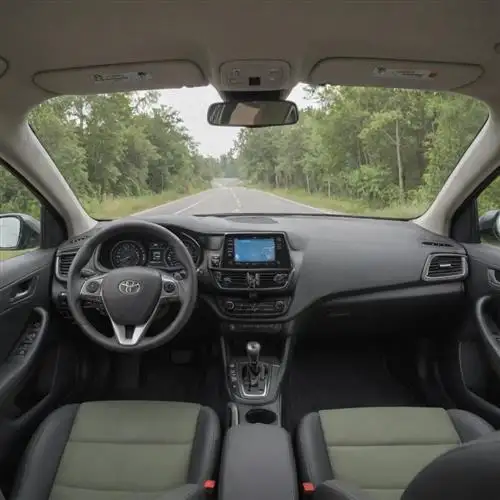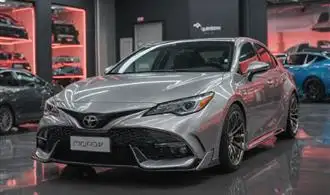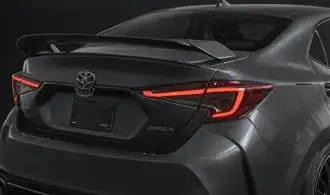
Fuel Efficiency Showdown
When it comes to fuel efficiency, the Toyota Corolla stands out as a clear champion. Boasting an impressive EPA-estimated 31 miles per gallon in the city and 38 miles per gallon on the highway, the Corolla delivers exceptional fuel economy that is hard to match. In contrast, the Ford Focus, while a capable compact car, falls short with an EPA-estimated 26 miles per gallon in the city and 36 miles per gallon on the highway.
The Corolla's superior fuel efficiency can be attributed to its advanced engine technology and aerodynamic design. The car's 1.8-liter four-cylinder engine, paired with a continuously variable transmission (CVT), provides an optimal balance of power and efficiency. Additionally, the Corolla's streamlined body shape and reduced drag coefficient contribute to its impressive fuel-sipping capabilities.
Owning a Toyota Corolla means you'll spend less time and money at the gas pump. This translates to substantial long-term savings, making it a practical choice for commuters, families, and anyone seeking a reliable and economical vehicle. Compared to the Ford Focus, the Corolla's fuel efficiency advantage can save you hundreds, if not thousands, of dollars in fuel costs over the life of the vehicle.
But the Corolla's fuel efficiency advantages don't stop there. The car's impressive reliability and low maintenance costs further enhance its long-term value. Toyota is renowned for its commitment to quality, and the Corolla is a testament to this reputation. With a reputation for exceptional durability and longevity, the Corolla is a smart investment that will continue to deliver impressive fuel efficiency and cost savings for years to come.
Dependability Dilemma
In the long-running battle of compact sedans, the Toyota Corolla and Ford Focus have been perennial rivals, each offering unique advantages that cater to the diverse needs of car buyers. However, when it comes to the crucial aspect of dependability, the Toyota Corolla emerges as the clear winner, delivering a proven track record of reliability that sets it apart from its competitor.
The Toyota Corolla's reputation for dependability is built upon decades of engineering excellence and a commitment to quality that is deeply ingrained in the company's DNA. This compact sedan has consistently ranked among the most reliable vehicles in its class, with independent industry studies and customer surveys consistently highlighting its exceptional performance in this regard.
At the heart of the Corolla's dependability lies its robust and well-engineered powertrain. The Corolla's engines are known for their longevity, with many owners reporting trouble-free operation for well over 200,000 miles. This is a testament to Toyota's meticulous attention to detail and the use of high-quality components that are designed to withstand the rigors of everyday driving.
In contrast, the Ford Focus, while offering a compelling package in terms of features and driving dynamics, has struggled to match the Corolla's reputation for long-term dependability. The Focus has been plagued by various issues, including transmission problems and other mechanical gremlins, which have resulted in a less than stellar reliability record. This has led to increased maintenance costs and, in some cases, premature failures, leaving owners frustrated and concerned about the long-term viability of their investment.
The Corolla's proven reliability translates into tangible benefits for the owner. Fewer breakdowns, reduced maintenance expenses, and the peace of mind that comes with knowing your car will faithfully get you from point A to point B, day in and day out, are all significant advantages that the Corolla offers over the Focus. This dependability factor is particularly crucial for those who rely on their vehicles for commuting, long-distance travel, or any other mission-critical transportation needs.
Moreover, the Corolla's reputation for dependability has a positive impact on its resale value. As a reliable and durable car, the Corolla tends to hold its value better than its competitors, making it a more attractive proposition for those who plan to keep their vehicle for an extended period or those who may need to sell it down the line.
Comfort Conundrum
The Toyota Corolla has long been hailed as a reliable and practical choice for car buyers, and for good reason. When comparing it to the Ford Focus, the Corolla's comfort features are a standout. From the moment you slip into the driver's seat, you're enveloped in a cabin that prioritizes your well-being, ensuring a smooth and enjoyable driving experience.
One of the key aspects of the Corolla's comfort is its impressive seating. The seats are designed with ergonomics in mind, providing ample lumbar support and adjustable headrests to cater to a variety of body types. The cushioning is just the right balance of firm and plush, allowing you to sink in comfortably without feeling like you're sinking too deep. This is particularly important for longer drives, where maintaining a proper posture can make all the difference in preventing fatigue and discomfort.
The Toyota Corolla's cabin also boasts impressive noise isolation, thanks to its well-engineered sound insulation and acoustic engineering. You'll find that road noise, wind noise, and engine noise are all expertly muted, creating a serene and peaceful environment for you and your passengers. This attention to detail makes the Corolla a standout choice for those who value a quiet and distraction-free driving experience.
Climate control is another area where the Corolla excels. The available dual-zone automatic climate control system allows you and your front-seat companion to individually customize the temperature to your preferences. The vents are strategically placed to ensure efficient air circulation, keeping the cabin at your desired comfort level no matter the weather conditions outside.
Ride quality is also a notable strength of the Toyota Corolla. The suspension system is tuned to provide a smooth and composed ride, absorbing bumps and imperfections in the road with ease. This translates to a sense of relaxation and control behind the wheel, making long commutes and road trips a breeze. The Corolla's steering is also well-weighted, offering a direct and responsive feel that instills confidence in the driver.
Driving Dynamics Dilemma
The driving dynamics dilemma when choosing between the Toyota Corolla and the Ford Focus can be a real conundrum for many car buyers. Both vehicles offer unique handling characteristics and performance capabilities, making it crucial to understand the nuances to make an informed decision. The Toyota Corolla is renowned for its smooth, comfortable ride, prioritizing a refined driving experience over outright performance. Its suspension setup, while not necessarily geared towards aggressive cornering, provides a level of predictability and control that many drivers appreciate, especially in everyday driving conditions. The steering is well-weighted, offering a nice balance between responsiveness and ease of use, making the Corolla a joy to maneuver in city traffic or on the highway.
In contrast, the Ford Focus is often lauded for its sporty driving dynamics, with a more responsive and direct steering feel. The Focus is tuned for a bit more agility, allowing the driver to tackle winding roads with confidence. The suspension, while not as compliant as the Corolla's, provides a heightened sense of connection to the road, appealing to enthusiasts who prioritize a more engaging driving experience. However, this sportier setup can come at the expense of comfort, as the Focus may transmit more road imperfections into the cabin, particularly on rougher surfaces.
Ultimately, the choice between the Toyota Corolla and the Ford Focus in terms of driving dynamics will come down to personal preference and the driving conditions you encounter most frequently. If you value a smooth, comfortable ride and a relaxed driving experience, the Corolla may be the better option. However, if you're seeking a more spirited driving character and are willing to sacrifice some comfort for a more engaging behind-the-wheel feel, the Focus could be the way to go. It's worth noting that both vehicles offer a range of trim levels and options, so be sure to test drive various configurations to find the one that best suits your driving needs and preferences.
Pricing Predicament
When it comes to selecting a compact sedan, the Toyota Corolla and Ford Focus are two of the most popular options on the market. While both offer reliable and affordable transportation, the pricing structure can play a significant role in the decision-making process. Let's dive into the pricing predicament and explore the key factors to consider when weighing the cost of the Toyota Corolla against the Ford Focus.
The base model of the Toyota Corolla typically starts at a lower price point than the Ford Focus. This can be an attractive feature for consumers on a tight budget or those seeking the most basic transportation needs. However, it's important to note that the base model of the Corolla may not include all the features and amenities that are standard on the base model of the Focus, so it's crucial to carefully compare the included specifications to ensure you're getting the best value for your money.
As you move up the trim levels, the pricing gap between the two models can start to narrow. The higher-end trims of the Corolla, such as the XSE or the Hybrid variants, can approach or even surpass the cost of the mid-level trims of the Focus. This is where the comparison becomes more nuanced, as the additional features and performance capabilities of the higher-end models may justify the increased price tag for some buyers.
Another factor to consider is the availability of incentives and discounts. Both Toyota and Ford often offer various promotions, such as cash-back offers, low-interest financing, or lease deals, which can significantly impact the final price you pay. It's essential to stay informed about the current incentives and negotiate the best possible deal, regardless of which model you're considering.
Additionally, the cost of ownership, including fuel efficiency, maintenance, and insurance, can play a role in the overall financial impact of your purchase. The Corolla is generally known for its superior fuel economy, which can translate to lower long-term fuel costs. On the other hand, the Focus may offer more sporty and engaging driving dynamics, which some buyers may be willing to pay a premium for.
















